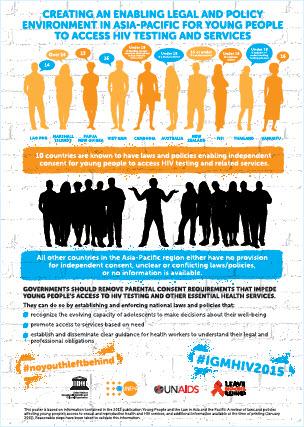
The sooner that a young person is tested for HIV, the sooner they can access life-saving treatments, and testing is also a key entry point to prevention.
In many countries in the Asia-Pacific region, a young person under 18 to consent to an HIV test unless they have consent from a parent or guardian.
But for many young people involving their parents in the decision to have an HIV test could be disastrous. Many young people will be reluctant to tell their parents that they’ve been having sex or that they’ve been using drugs. They fear their parents’ judgment and rejection, they may also fear violence or being kicked out of home, particularly for behaviours that are often stigmatized like drug use and same-sex relations.
So many will simply choose not to get tested at all, rather than having to involve their parents in the process.
Recognising this problem, some countries in Asia and the Pacific have introduced more flexible laws that allow young people to access HIV testing independently if certain conditions are met.
For example, some countries now allow a health care worker to assess a young person’s maturity, and if the young person is considered mature enough to understand the nature & consequences of an HIV test, then no parental consent is required. Or if it is clear from the circumstances that a child lacks maturity, the health care worker can still require parental consent. This is a flexible approach that allows individual assessment of a young person’s situation. It recognizes the reality that children mature at a different rate.
Other countries have lowered the age at which a young person can independently access an HIV test.
These good practices are highlighted in this infographic released by UNESCO and partners UNAIDS, UNFPA and Youth LEAD. Share widely! #noyouthleftbehind
Links:
